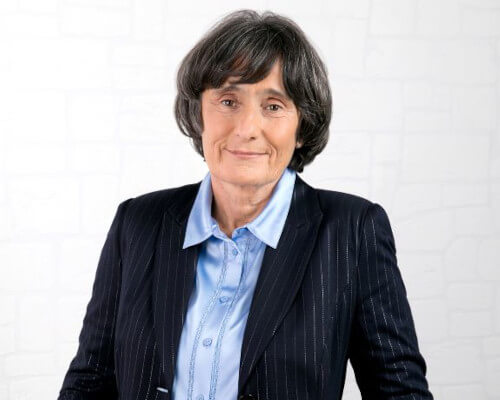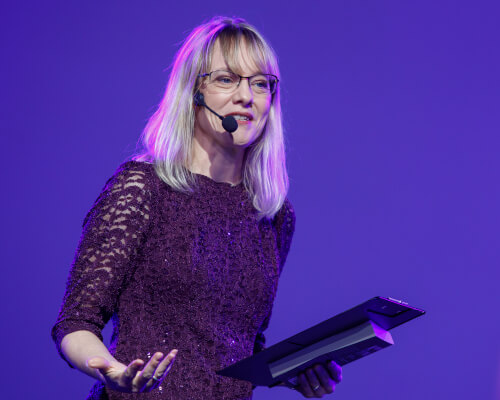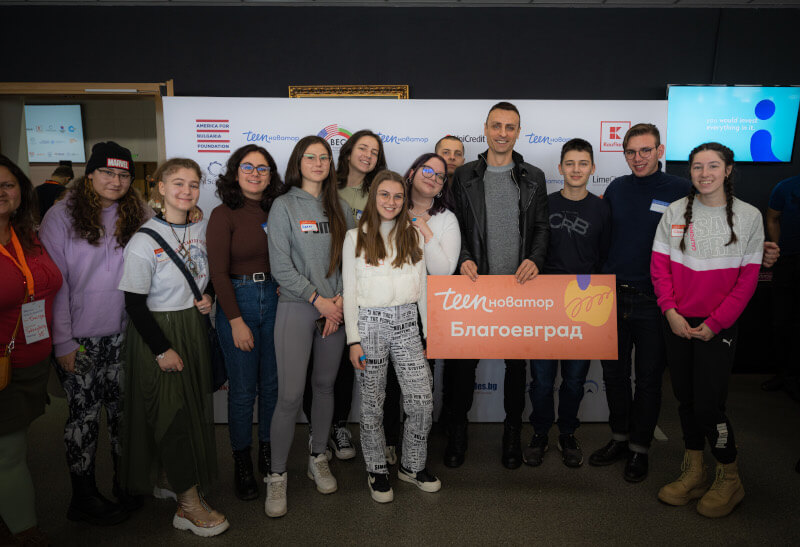
Dimitar Berbatov considers himself a little old school: he believes in success earned by hard work and perseverance, in the decisive role of family in the formation of young people, in empathy.
He credits his traditional upbringing for his early triumphs on the soccer pitch and his view of success as a responsibility toward those who come after him. (Some of his first opponents on the field were his dad’s generation — miners and other tough working men who played hard and worked the young player even harder, preparing him to face later challenges.)
Acting on his desire to give back 15 years ago, the global soccer star founded the Dimitar Berbatov Foundation in support of talented young Bulgarians and since then has steadfastly championed hundreds of promising athletes, competitive scientists, musicians, and visual artists. He has great admiration for families who support their children’s development no matter how modest their financial circumstances.
“Bulgaria has talent, has had it in the past, and will always have it. I had help from good people, so now I am trying to be one of those people and support these children.” This is how Dimitar Berbatov sums up his commitment to the future of Bulgaria — its youth.
In addition to his foundation work, he promotes young Bulgarians’ growth through support for social institutions and initiatives like the mentorship program with an entrepreneurial focus Teenovator.
We met with Mr. Berbatov during this year’s edition of Teenovator, where he was a special guest. We talked about his work supporting gifted youth, parenting, and the qualities needed to succeed in life.
America for Bulgaria Foundation: We have a shared interest in Bulgarian youth’s advancement as well as an anniversary in common: in 2023, ABF and the Dimitar Berbatov Foundation celebrate 15 years of work in Bulgaria. Anniversaries are opportunities to take stock, so please tell us: What prompted your interest in youth development?
Dimitar Berbatov: I have always liked helping others, but at the beginning of my career I did it sporadically and somewhat chaotically. As far as the foundation is concerned, it was its current director, Dimitrina Hodjeva’s idea. She and I had known each other for a long time, I appreciated her qualities and trusted her, so I realized that she was right in suggesting that we do something slightly more long-term. At the time, I was in England and was gaining more fame. I received invitations to support different causes all the time, and it was kind of natural to conclude that we could have a cause ourselves and “use” my popularity in a more organized, sustainable way. I realized how many people had helped me get to where I was then, and I was clearly mature enough to want to give something back to the next generation.
This is how the cause was born — from the fact that I achieved success because I have a talent and met good people who provided support and kept me on the right path when I strayed. And from my belief that children who develop their potential will be useful to society someday. Now, 15 years later, I am satisfied with my decision about the foundation and the cause.
ABF: With a career spanning over a quarter century and 15 years of experience working with young people, you know a lot about talent development. Is talent sufficient, or are there other important prerequisites for success?
Berbatov: Talent alone will help you achieve 80% of your potential, and that’s if you’re very talented. But if you are hardworking, stubborn, and persistent in cultivating your talent, you can get to 100%. Some people are happy with 80%; I’ve been OK with that at times. It’s a matter of choice what you do with your talent and how you develop it. Getting excited about an idea is easy, but it will be difficult to accomplish anything if you do not have persistence — and stubbornness — because life is difficult. If I hadn’t been stubborn, I wouldn’t have gone where I did.
Even those who don’t fully develop their potential haven’t lost anything for trying. Quite the opposite: they are all the richer for experiencing triumphs and losses, for gaining experience and friends. At a tender age, they learn a lot about themselves. This is development, too.
Family has the greatest impact on how young people develop, at least initially. It is also important that young people get to make their own choices and not fulfill their parents’ ambitions. They will inevitably make mistakes, but maybe these mistakes will be less significant if there is dialogue between parents and their children. I am a parent and sometimes I struggle to talk to my older daughter, who is 13. I know that I hit a wall with her at times, but I also know that this is my role — not to break down her wall but to try and go around it, sometimes jump over it. I point out examples that she can learn from and avoid big mistakes. She can afford to make other, smaller mistakes because that will teach her to make decisions.
I won’t be around forever, so she shouldn’t get used to having things delivered on a platter. It is harmful for children to grow up feeling entitled. They have to make their own choices, their own way in life.
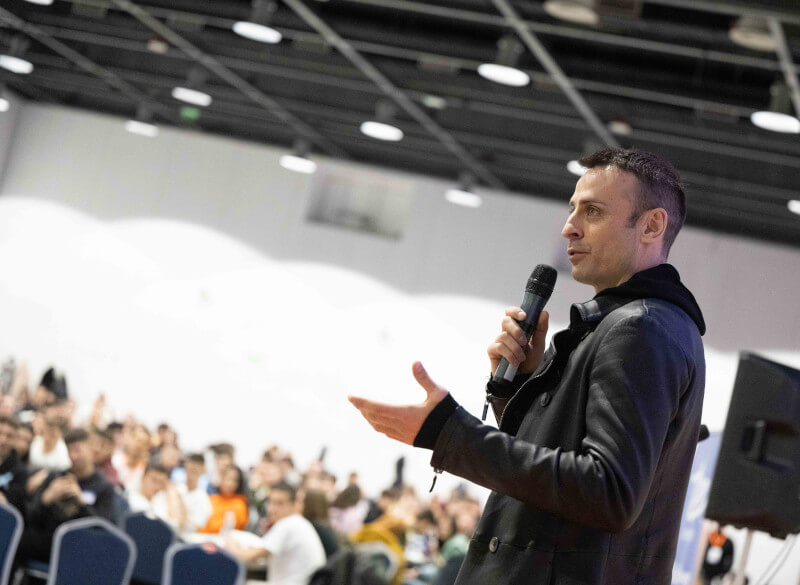
ABF: Would you advise young people to follow their inner voice?
Berbatov: I don’t want to be the guy who thinks he knows everything. Far from it. That’s why I always look back on my own experience. Fame can go to your head, and when you do something very well, such as play soccer, you may end up thinking that you are competent in all other matters, which is far from the truth.
Discipline is a very important quality for a person’s development, and you never really stop working on yourself. I talk to friends and colleagues, and we come to the conclusion that sometimes we have more questions than answers.
When you have so many people watching you, especially kids who look up to you, it makes you more careful… I often sit and think, Am I saying the right thing? Am I conveying the right message to these kids? Do they understand me, am I saying it right? Am I the right mentor for these kids?
Discovering as early as possible what they want to do and loving what they do will save young people a lot of wandering around and feeling lost. Soccer is my first love, and this love is eternal. When an athlete stops playing, he dies a little…
Maybe you can’t be really successful unless you love what you do.
I know that life is unfair and difficult for a lot of people, and many of them have jobs they don’t like. I understand this. Maybe this is why I allow myself to tell youngsters that if they find what they want to do at an early age and really focus on it, it will save them from wandering in life and making a lot of mistakes.
ABF: You communicate with a lot of people who are just starting out in life. What does this interaction give you?
Berbatov: It gives me a lot of energy. At times, interacting with young people winning European and world championships and science competitions and knowing that my competitive life is behind me makes me a little sad, but it also motivates me to do better in the things I am starting to learn.
ABF: Are there stories of young people supported by the Dimitar Berbatov Foundation that you find especially inspiring?
Berbatov: There have been so many stories over 15 years, and they are all inspiring. Some parents refuse financial support because they are doing well in their professions and, as a result, can support their children’s aspirations. That has always impressed me. They seek membership “in the club” not to get money, but in order to be part of a community with shared values. It turned out that it was important for gifted children from different fields to know each other, to communicate with each other. And we succeeded in building such a community; it was difficult, but our efforts and persistence paid off.
Families with financial difficulties are always there for their children, too. There is no accomplished child without a devoted family by their side at the beginning. Despite the various challenges they experience, parents encourage their children’s persistence and love for what they do. They take out loans just so their children can participate in a competition somewhere. We have had different requests; that’s what we are for. We have purchased all kinds of things over the years: from leotards, pointe shoes, and skates to plane tickets and tools… Through the foundation, I met some really great parents who have a very sober judgment of what is important and what isn’t. There are also those rare few who overestimate their children and teach them that everyone owes them. No one owes anyone anything. That’s something I tell my kids, too. “No one owes you anything. You have to achieve everything on your own merits. You’ll get so much satisfaction doing that.”
Talent has to be supported, encouraged, guided. We are not a financially powerful foundation, but we are flexible and creative. We constantly initiate and develop projects in support of our cause. We also have principles that we stand by, and people respect our policy of transparency and fairness, even if they don’t always like our strict requirements. We value feedback from “our” children, and it guides us in launching new initiatives. We constantly try to keep up with them and with the changes. That’s why we’ve been around for 15 years and there are people all over the country who know and like us.
I would like to take this opportunity to thank our various donors as well. Because we are not a foundation with infinite financial resources and every donation matters! We usually receive small, sometimes symbolic donations, but they are valuable because, in addition to contributing to the budget, they mean that people approve of our work and trust us. Reputation is the most important thing in our work. If people place their trust in you, together you will be a real force.
I am proud of what the foundation has become.
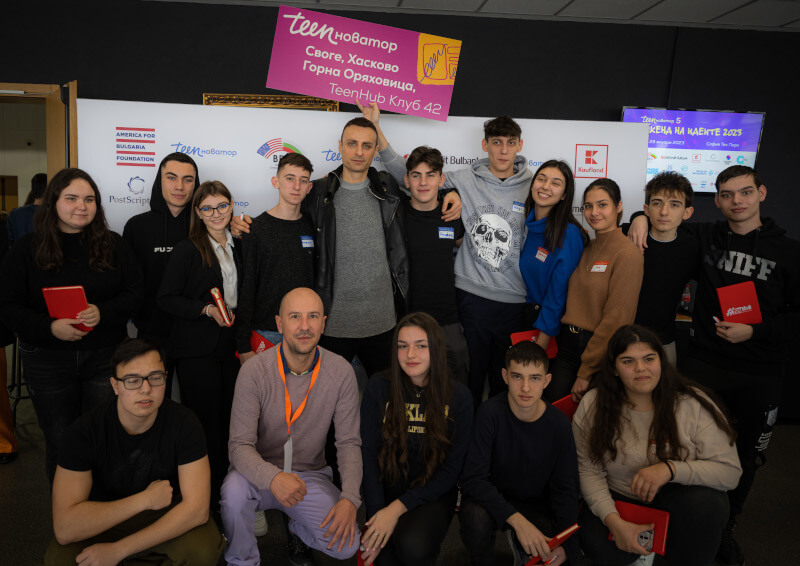
ABF: What made you relate to a startup incubator like Teenovator? Why did you decide to support a mentorship program with an entrepreneurial focus?
Berbatov: I guess everything starts with an idea. My idea was to become a good soccer player, and I made it happen. The boys and girls from Teenovator have their own ideas, they are ambitious, and they are working on their ideas. They are honing their knowledge and talent. If they are tenacious, if they persevere, they will finally realize these ideas. I see myself in what they’re trying to do, so it wasn’t hard to relate to the whole thing.
I hope they heard what I had to say. I was with them only briefly, but sometimes all you need is five minutes with the right person. At times, five years with the wrong person will get you nowhere.
The world is not an easy place. Nobody owes you anything, you have to work and pursue your goals. This holds even more true for children from wealthy families if they want to acquire the qualities to become good people.
The Teenovator boys and girls work in teams, which I have done my entire professional life. Yes, there are individuals on that team, but they are the team’s constituent parts. Sometimes, the team helps you show how good you are. At other times, someone else will get the spotlight. But teamwork is the most important thing. It keeps the whole thing together. Young people must learn to work in a team.
In challenging moments, individuals may rise to the occasion and offer a solution that helps the team. You may be the biggest scorer, but for the ball to reach you, it has passed through different levels of teamwork, and your scored goal is just the cake’s icing. If you forget this, those layers before you, eventually you will be out of that team. But if you understand the importance of teamwork and show your team the necessary respect, you will become even better.
Support a gifted young Bulgarian by donating to the Dimitar Berbatov Foundation.
